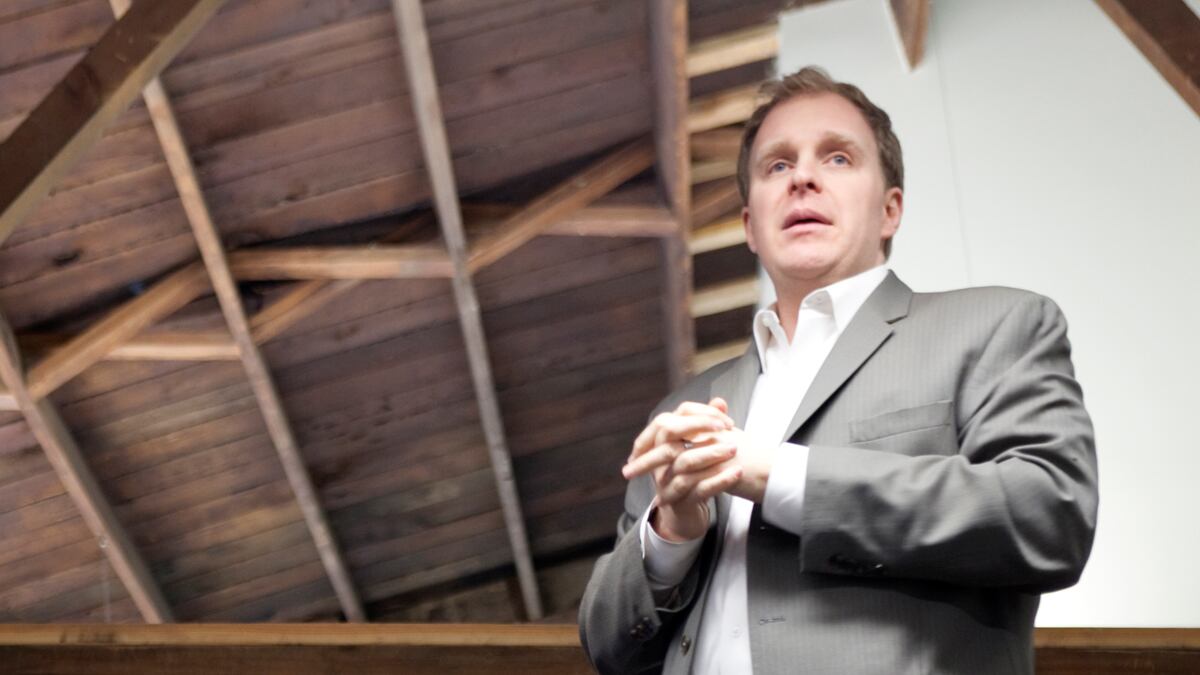Jefferson Smith picked the wrong time to make his political comeback.
The #MeToo movement, which is uniting the survivors of abuse and generating scrutiny of prominent men everywhere, arrived in Oregon over the weekend with authority. It played a key role in Smith's resignation from his new job running the Oregon Center for Public Policy.
The movement earlier clouded the future for state Sen. Jeff Kruse (R-Roseburg), who is under investigation for complaints of inappropriately touching two colleagues. It also damaged the reputation of former Portland Mayor Sam Adams, who faces a six-page complaint of harassment from his former assistant.
But last week, Smith, a founder of the voter-registration nonprofit Oregon Bus Project and a former lawmaker, was the first prominent Oregonian to lose his job amid controversy about his behavior. His resignation became public Nov. 11, one day after a letter from progressive leaders cited conduct that included his 1993 punching of a woman while he was in college.
"We believe many women have their own stories and experiences from interactions with Mr. Smith," the letter said. "We worry that additional incidents have occurred, but the victims have been silenced by his position of power. Should additional victims exist, our concern is that they would be further victimized by rewarding him with a new title and opportunity."
In a statement, Smith said he's listening.
"There are a lot of committed people listed on that letter who I respect," Smith said. "I'm keenly aware that their concern stems from my own inexcusable conduct in the past. I will always be deeply sorry. I started therapy in 2012, and continue it now. It's clear to me that what they said means that I have more work to do to be a better human being and create more nurturing space."
The backlash, however, went further than a single letter, WW has learned. On that same day, some of the labor unions and individuals who help fund OCPP's $600,000 annual budget also wrote to the board, pulling their money. The authors included John Larson, president of the Oregon Education Association, David Rives, president of the American Federation of Teachers, and Robert Stoll, a retired trial lawyer.
"Mr. Smith's reputation on a number of issues, and his credibility, in our opinion, will greatly interfere with OCPP's mission of persuasively presenting unbiased facts and factual analysis," said the letter. "As a consequence, we have decided not to participate in funding OCPP."
The pushback left observers questioning the policy center's decision to hire Smith.
"It was shocking to me in this environment that they would go forward with the job offer to Mr. Smith," says Paige Richardson, a longtime Oregon political consultant.
The job heading OCPP, the leading independent policy think tank in Oregon, represented a comeback for Smith. He was in his second term as a state representative from East Portland when he ran for Portland mayor in 2012.
During his general election runoff against eventual winner Charlie Hales, WW reported that while attending the University of Oregon in 1993, Smith struck a woman in the face, requiring her to get five stitches.
Upon learning reporters were pursuing that story, Smith appeared on the woman's doorstep unannounced, frightening her, and later gave a misleading version of what happened in 1993.
The progressive leaders who signed last week's letter, including Beth Bernard, executive director of the Oregon Trial Lawyers Association; Jillian Schoene, co-executive director of Emerge Oregon, which trains women to run for political office; Jenny Smith, statewide political organizer for the Oregon Education Association; Amy Hojnowski of the Sierra Club; and Roey Thorpe, former executive director of Basic Rights Oregon, said that episode was a disqualifier.
"Hiring a man with such a clear and publicly known history to lead a progressive organization signals to the women of our movement that they do not matter," they wrote.
OCPP had plenty of warning that Smith's hiring could be a problem.
In August, after the board winnowed its list of candidates to Smith and former Portland City Commissioner Steve Novick, WW reported that former Gov. Ted Kulongoski and trial lawyer Thane Tienson were so disappointed they resigned from the center's board.
Yet leaders at OCPP deny that backlash played a role in the reversal. Board chairman Will Neuhauser says Smith quit for family reasons.
"We're disappointed that he ultimately he did not accept the job," Neuhauser said. "I can't speculate beyond his family's health issues, which he shared with me on Wednesday, and shared with a board committee on Thursday."
Smith declined to address what role critics' objections might have played in his resignation.
"I decided to withdraw from OCPP for personal reasons," he said.
Richardson says the center's board let everybody—including Smith—down.
"I couldn't believe the board ignored those resignations," she says. "That should have caused them to take concerns about Mr. Smith seriously and look further."

